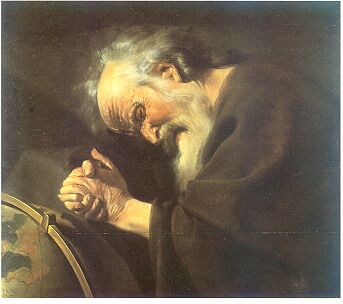‘Ever-newer waters flow on those who step into the same rivers’
A Greek Philosopher of the late 6th century BCE, Heraclitus criticizes his predecessors and contemporaries for their failure to see the unity in experience. He claims to announce an everlasting Word (Logos) according to which all things are one, in some sense. Opposites are necessary for life, but they are unified in a system of balanced exchanges. The world itself consists of a law-like interchange of elements, symbolized by fire. Thus the world is not to be identified with any particular substance, but rather with an ongoing process governed by a law of change. The underlying law of nature also manifests itself as a moral law for human beings. Heraclitus is the first Western philosopher to go beyond physical theory in search of metaphysical foundations and moral applications.
‘On those stepping into rivers staying the same other and other waters flow’

Heraclitus 'The Obscure'.
There is an antithesis between ‘same’ and ‘other.’ The sentence says that different waters flow in rivers staying the same. In other words, though the waters are always changing, the rivers stay the same. Indeed, it must be precisely because the waters are always changing that there are rivers at all, rather than lakes or ponds. The message is that rivers can stay the same over time even though, or indeed because, the waters change. The point, then, is not that everything is changing, but that the fact that some things change makes possible the continued existence of other things. Perhaps more generally, the change in elements or constituents supports the constancy of higher-level structures.As for the alleged doctrine of the Identity of Opposites, Heraclitus does believe in some kind of unity of opposites.
‘Of this Word’s being forever do men prove to be uncomprehending, both before they hear and once they have heard it. For although all things happen according to this Word they are like the unexperienced experiencing words and deeds such as I explain when I distinguish each thing according to its nature and declare how it is. Other men are unaware of what they do when they are awake just as they are forgetful of what they do when they are asleep.’
Heraclitus sees the great majority of human beings as lacking understanding. Most people sleep-walk through life, not understanding what is going on about them. Yet experience of words and deeds can enlighten those who are receptive to their meaning. (The opening sentence is ambiguous: does the ‘forever’ go with the preceding or the following words? Heraclitus prefigures the semantic complexity of his message.)

Recent Comments
pete says,
thank you very much this was very helpfulH M Yamada says,
There is something dire, dangerous and mysteriously compelling about these ...
Robert Horvitz says,
Belated thanks for citing my work! I have a newer ...
article/about says,
Berber as well as Arab nomads took their caravans of ...
Betty Wood says,
Sometimes when I create something beautiful I feel like someone ...